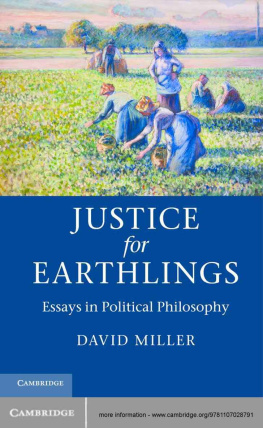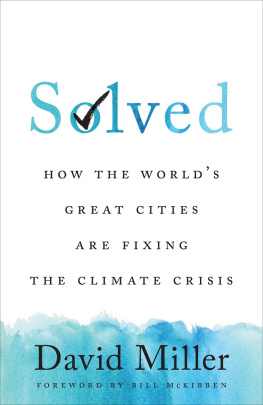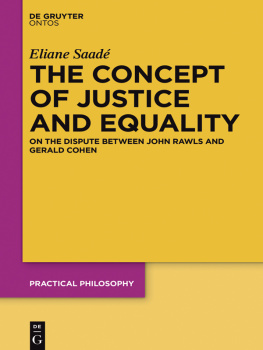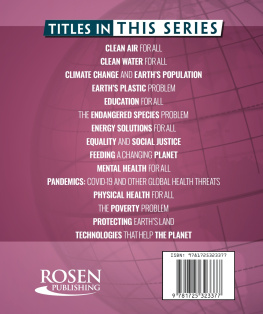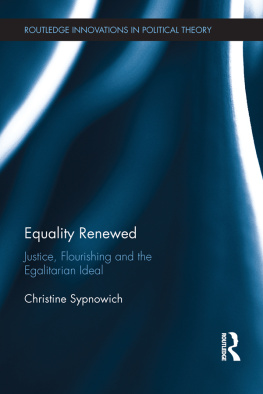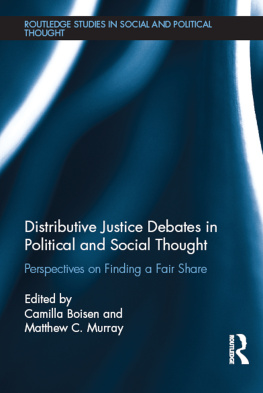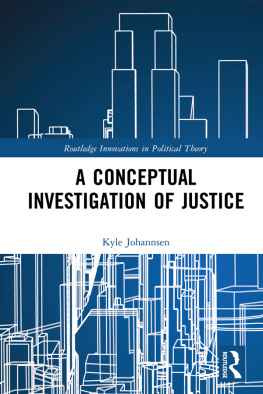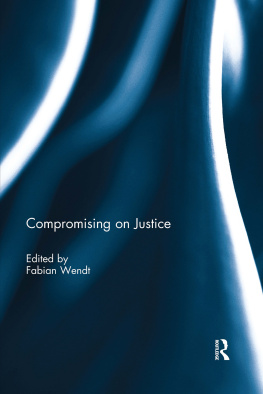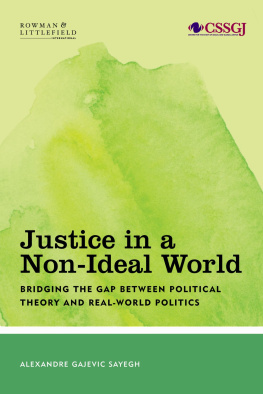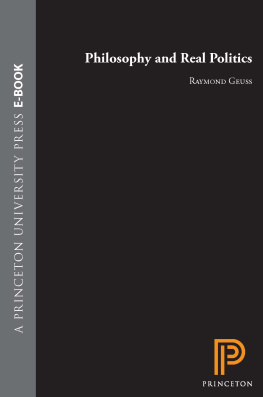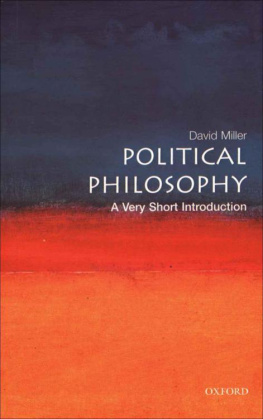Justice for Earthlings
Essays in Political Philosophy
In the past few decades social changes have impacted how we understand justice, as societies become both more multicultural and more interconnected globally. Much philosophical thought, however, seems to proceed in isolation from these developments. While philosophers from Plato onwards have portrayed justice as an abstract, universal ideal, Miller argues that principles of justice are always rooted in particular social contexts, and connects these ideas to the changing conditions of human life. In this important contribution to political philosophy, it is argued that philosophers need to pay more attention to the way that people actually think about what's fair, and only defend principles that are feasible to apply in the real world. To understand equality of opportunity, for example, we must explore the cultural constraints that people face when presented with life choices. Justice for Earthlings also explains how national boundaries make justice at a global level different from social justice.
David Miller is Professor of Political Theory and an Official Fellow at Nuffield College, University of Oxford. He is also a Fellow of the British Academy.
Justice for Earthlings
Essays in Political Philosophy
David Miller
CAMBRIDGE UNIVERSITY PRESS
Cambridge, New York, Melbourne, Madrid, Cape Town, Singapore, So Paulo, Delhi, Mexico City
Cambridge University Press
The Edinburgh Building, Cambridge CB2 8RU, UK
Published in the United States of America by Cambridge University Press, New York
www.cambridge.org
Information on this title: www.cambridge.org/9781107613751
David Miller 2013
This publication is in copyright. Subject to statutory exception and to the provisions of relevant collective licensing agreements, no reproduction of any part may take place without the written permission of Cambridge University Press.
First published 2013
Printed and Bound in the United Kingdom by the MPG Books Group
A catalog record for this publication is available from the British Library
Library of Congress Cataloging in Publication data
Miller, David, 1946 March 8 author.
Justice for earthlings : essays in political philosophy / David Miller.
pages cm
Includes index.
ISBN 978-1-107-02879-1 (hardback)
1. Political science Philosophy. 2. Justice. I. Title.
JA71.M4565 2012
320.011 -- dc23 2012037568
ISBN 978-1-107-02879-1 Hardback
ISBN 978-1-107-61375-1 Paperback
Cambridge University Press has no responsibility for the persistence or accuracy of URLs for external or third-party internet websites referred to in this publication and does not guarantee that any content on such websites is, or will remain, accurate or appropriate.
Contents
Acknowledgements
Many people have helped me in writing the essays collected in this book, through discussion and comment: some of these are acknowledged individually at the beginning of each essay, but many more are not. Here I should like to add my thanks to: Richard Fisher of Cambridge University Press, for responding enthusiastically to my original suggestion for this book; Barbara Schmitz, for extended discussion of several of the themes it contains; Margaret Moore, for helpful advice on the Introduction; and last but not least, Jerry Cohen, whose untimely death has deprived me not only of a valued friend and colleague, but also someone whose powerfully argued, but contrary, views have constantly spurred me to develop my own. It is no accident that the first and last of these essays have been directly inspired by his work.
I should like to thank the publishers for permission to reprint essays that first appeared in the following places:
Political Philosophy for Earthlings in D. Leopold and M. Stears (eds.), Political Theory: Methods and Approaches (Oxford University Press, 2008). By permission of Oxford University Press.
Two Ways to Think about Justice in Politics, Philosophy and Economics , 1 (2002), 528. SAGE Publications Ltd.
Social Justice in Multicultural Societies in P. Van Parijs (ed.), Cultural Diversity versus Economic Solidarity (Brussels: Deboeck University Press, 2004 with the Francqui Foundation).
Liberalism, Equal Opportunities and Cultural Commitments in P. Kelly (ed.), Multiculturalism Reconsidered (Cambridge: Polity Press, 2002).
Equality of Opportunity and the Family in R. Reich and D. Satz (eds.), Toward a Humanist Justice: The Work of Susan Moller Okin (Oxford University Press, 2009).
Justice and Boundaries in Politics, Philosophy and Economics , 8 (2009), 291309. SAGE Publications Ltd.
Social Justice versus Global Justice? in O. Cramme and P. Diamond (eds.), S ocial Justice in the Global Age (Cambridge: Polity Press, 2009).
Are They My Poor?: The Problem of Altruism in a World of Strangers in Critical Review of International Social and Political Philosophy , 5 (2002), 10627. Taylor & Francis Group.
Taking Up the Slack? Responsibility and Justice in Situations of Partial Compliance in C. Knight and Z. Stemplowska (eds.), Responsibility and Distributive Justice (Oxford University Press, 2011).
Introduction
This book collects a number of my essays about justice written over the period 20002010. It was a good decade for writing about justice, judging by the stream of books and articles that academic political philosophers produced, but not so good for justice itself. Justice in this context means justice in the distribution of rights and opportunities, income and wealth, goods and services what is often called social justice, though the term has become problematic, as we shall shortly see. The philosophers who write about justice nearly all understand it as requiring some form of equality, and there has been intense debate about exactly which form should be chosen; there is also intense debate about how widely the justice net should be cast, whether the aim should be equality within each separate political community or equality worldwide. Whichever way the idea of justice is understood, however, the real world seems to have moved in entirely the opposite direction. Levels of interpersonal inequality have relentlessly increased, both nationally and globally, mainly because in both developed and developing countries a class of super-rich persons has emerged, easily able to outflank the policies states have traditionally employed to reduce inequality among their citizens. Alongside this, there is evidence that public opinion, even in countries with strong traditions of social democracy, has become more tolerant of inequality. Fewer people now think that it is part of the state's business to redistribute income and wealth in favour of the poor. There is certainly anger at the present time directed against rich bankers and financiers who are thought to have inflicted harm on others by virtue of their risky behaviour, but this does not extend to sports stars and celebrities whose extravagant lifestyles are seen as appropriate reward for having won out in the lottery of life.
In this context, it is puzzling, to say the least, that philosophical enquiry into distributive justice should have largely been directed at exploring new and increasingly radical forms of egalitarianism. The prime contender here is the position that has come to be known as luck egalitarianism. What justice requires, on this view, is that people should all enjoy the same level of advantage unless they have made choices that lead to their having either less or more than others. Advantage here is a term of art that can be interpreted in different ways, but for simplicity's sake assume that it means resources such as income and wealth. Then the luck egalitarian principle holds that the only thing that should affect the level of material resources that someone now has are the choices they have made over time about how to live, what work to undertake and so forth. The effects of all forms of unchosen luck are to be neutralized by compensation. Unchosen luck will include the circumstances someone is born into, the talents they are born with, the effects of other people's behaviour on their prospects and so forth. A moment's reflection will reveal how extraordinarily demanding this principle is, whether applied nationally or globally. To put it fully into practice would require some agency capable of monitoring the situation of each individual person and working out how far their present resource level could be attributed to luck on the one hand and choice on the other, and then calculating, counterfactually, what their position would have been if the effects of luck had been neutralized and only choice remained. Then the agency would have to extract resources from the beneficiaries of good luck in order to provide compensation to the beneficiaries of bad luck.

